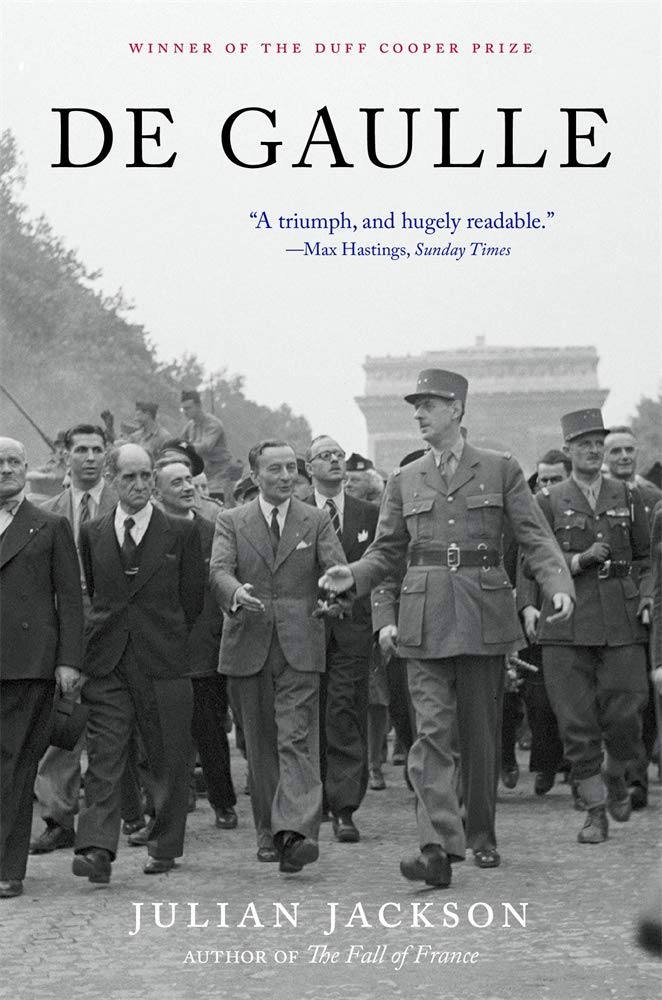Julian Jackson, a professor of history at Queen Mary University of London, has painstakingly researched the life of a man, Charles de Gaulle, who dedicated himself in every effort, whether in war or peace, to the solitary goal of securing grandeur for his country. “France,” de Gaulle once wrote, “cannot be France without grandeur.”
With a subject who has a long and complicated history, Jackson’s 887-page tome is fittingly called De Gaulle.
In pursuing this goal, de Gaulle made enemies aplenty, alienated allies, and almost made it a point to insult those who would aid him.
When we think of this Frenchman, popular thought goes first to his role as leader of the Fifth Republic, established by de Gaulle in 1958 and still in place as France’s republican system, which Jackson refers to as “de Gaulle’s most lasting achievement.” Secondarily, he comes to mind as the World War II leader of the Free French. A junior brigadier general at the time of Germany’s invasion, he refused to surrender and fled to London, where, through radio broadcasts and diplomatic efforts, he encouraged his countrymen to fight on. This daily “war of attrition against his allies to prevent himself from being subsumed by them” leveraged his “minuscule resources into securing for France a place among the victorious powers.”
But despite his contributions to victory in WWII, his name can still provoke a hostile response from those in the West, particularly in the United States. In May 1966, he announced that France was leaving the North Atlantic Treaty Organization and that all foreign troops on French soil were to be removed by April 1967. U.S. Secretary of State Dean Rusk asked if that number of foreign soldiers included the many American soldiers buried in French cemeteries who died defending France. He never received a response.
This Cold War disenchantment with de Gaulle and his frequent trips to the Soviet Union, Cambodia, and other Communist paradises continued to provoke desultory and unfavorable comments in the U.S. press. It is difficult to see anything else other than an anti-American animus in de Gaulle’s conduct during this time. One can find part of his bias in his letter to the Soviet Union’s First Deputy Chairman Alexei Kosygin:
“You must never forget that America has not existed very long. … It has no depth or roots. … It has never suffered, never been invaded. … Its reactions are always those of a country that does not know how to suffer.”

De Gaulle’s worldview wasn’t shared by most of the diplomats of the Quai d’Orsay, but the ambassadors recognized he was a global superstar.
On Jan. 9, 1959, the first government of the Fifth Republic was proclaimed. The launch to recapture grandeur had begun. But de Gaulle was already fighting an independence movement from Algeria’s National Liberation Front. Algeria had been a department of France for over 100 years, and granting it independence was no simple matter. De Gaulle did not have the army on his side, as they favored an “integrated” Algeria in which Algerians became full French citizens. But he neither believed in integration nor welcomed it. He asked one of his deputies, Alain Peyrefitte:
“Have you seen the Muslims with their turbans and their djellabas? You can see they are not French. Try to integrate oil and vinegar. Shake the bottle. After a moment they separate again. The Arabs are Arabs, the French are French. Do you think that the French can absorb ten million Muslims who will tomorrow be twenty million and after tomorrow forty? … My village would no longer be called Colombey-les-deux-Eglises but Colombey-the-two-Mosques.”
In the end, Algeria declared its independence on July 3, 1962. Another outpost of the empire fell. In the almost 40 years de Gaulle served France, in and out of uniform, he could look back and recall being wounded three times in World War I, being captured and held in a German prisoner-of-war camp for 32 months. He must have thought how thoroughly France’s army was humiliated by the Germans in 1940. He was not in uniform in 1954, but the fall of Dien Bien Phu in Vietnam certainly must have been painful. And lastly, the decade of the 1960s, when France said farewell to over 60% of its colonial possessions, would have been a bitter pill to swallow. No grandeur for France; no France.
Jackson put together a masterful study of one of France’s most complex leaders. Perhaps he was every bit as sarcastic, mean-spirited, and arrogant as his detractors claim. But the impression Jackson leaves his readers is de Gaulle left this life as an unhappy man. Perhaps it is best to remember him as his lifelong friend, the writer André Malraux, described him: “De Gaulle was the man from the day before yesterday and the day after tomorrow.”
Chris Timmers is a freelance writer in Columbia, S.C. His work has been published in the Weekly Standard and the Times Literary Supplement.
